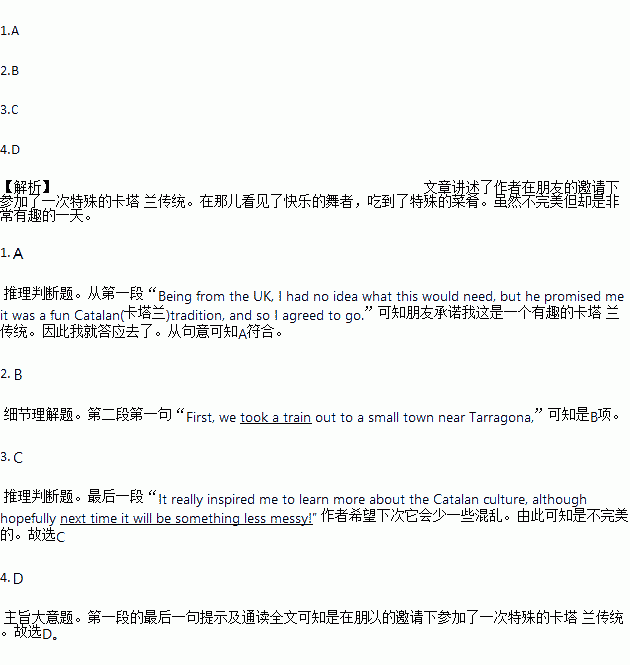题目内容
On Saturday my Catalan friend invited me to come along to a Calotada. Being from the UK, I had no idea what this would need, but he promised me it was a fun Catalan(卡塔兰)tradition, and so I agreed to go. I wasn’t disappointed!
First, we took a train out to a small town near Tarragona, about an hour away from Barcelona centre. I was already amazed by how different everything looked from the city as the train rushed through small towns, all sitting on the coastline.
When we arrived, we were greeted by the sight of a small wind instrument band and about a dozen people dancing in a circle. While my friend later told me that it is a traditional Catalan dance called La Sardana, at the time I was totally confused at what I was seeing! It seemed so strange but yet so lovely that they were doing this dance completely for themselves.
Once we had been fully entertained by the dancers, we finally went inside for the Calotada and it was soon revealed to me what it actually was. We sat down at the table and a huge plate of leeks(大葱)was placed in front of us. It was explained to us that you have to peel the leeks with your fingers, dip them in a (delicious!) sauce and eat them. This sounds easier than it was.
My friend had been right in the end, it had been an extremely fun day and it felt great to get involved in a local tradition of a place I am temporarily calling home. It really inspired me to learn more about the Catalan culture, although hopefully next time it will be something less messy!
1.What made the author accept his friend’s invitation?
A. To experience a different tradition
B. To get a further knowledge of his friend
C. To free himself from the pressure of studies
D. To make a record of Catalan traditions
2.How did they go to a small town near Tarragona?
A. By taxi B. By train
C. By water D. By bike
3.What can we infer from the last two paragraphs?
A. The author was tired of eating leeks
B. They participated in the local dancers
C. The author doesn’t think the Catalan culture is perfect
D. The author had a through research on Italian traditions
4.What is the best title for the passage?
A. Traveling with a Friend Abroad B. A Special Dish Astonished Me
C. A Day’s Journey Changed Me D. Taking Part in Traditions

